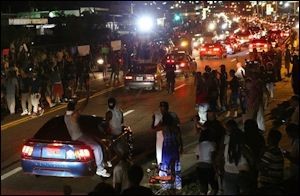by James A. Bacon
As the national debate rages over police killing of blacks, Mark Bowes has conducted some excellent reporting for the Richmond Times-Dispatch. It’s easy to argue by media-fueled anecdote, as the United States has been doing for months now. But at some point, we need to look at the numbers. Bowes has compiled a list of all “justifiable homicide” police killings in Virginia between 1990 and 2013. While the numbers do not conclusively settle the question as to whether blacks are being unfairly singled out for state-sanctioned, police violence, they do narrow the parameters of the debate significantly.
According to Bowes, Virginia police have reported 130 people killed by police in “justifiable homicides” since 1990. Of those, 59 were black (45.5%), 70 were white and one was Asian. (The percentages for more recent years, 2000 to 2013, were roughly the same.) The African-American population in Virginia is about 20%.
By the most superficial measure imaginable, then, blacks are more than twice as likely as whites to get killed by police. But the picture changes when the fatal-shooting ratio is compared to the percentage of violent crimes committed by African-Americans, about 60%. If we’re comparing people who engage in violent crime, blacks are less likely to be shot by police than whites. On the other hand, if we compare the fate of people assaulting law enforcement officers, blacks are somewhat more likely to be killed than whites. The experts quoted by Bowes agree that raw numbers will only take the analysis so far. It’s important to know the circumstances surrounding each shooting.
“Police killings are not random, and we shouldn’t expect killings to be proportionate to the population percentages, but instead proportionate with potentially violent encounters with police,” said Thomas R. Baker, a criminologist at Virginia Commonwealth University.
Baker homed in on another critical dynamic. Scholarly research indicates that blacks have more negative views of police officers than whites do, and they are less likely to cooperate with police.
Much of this distrust and dissatisfaction comes from negative direct and vicarious experiences with the police, including media accounts, and has unfortunately become inculcated among many black Americans. At the same time, police officers are not insensitive to this distrust and dissatisfaction, and may enter encounters with blacks on highest alert.
Providing additional training for police likely will have little effect unless accompanied by cultural changes on how police are perceived in the African-American community, Baker said.
Blacks have legitimate reasons, based in history, to distrust the fairness and objectivity of police. The question is the extent to which that distrust is justified today. Those who are committed to the idea of America as a fundamentally unjust society will say, of course, that it is fully justified. By picking a handful of incidents from across a nation of 320 million people, which then are magnified by the media, they can generate powerful images in support of their position.
But anyone can prove anything by cherry picking the data. Colin Flaherty, author of “White Girl Bleed a Lot,” has built a franchise around the documentation of black-on-white crime, most of which is ignored by mainstream media. Does this anecdotal data prove the existence of a black-on-white crime wave? No. We need to see the numbers.
Let us hope that Virginia never descends into the racial turmoil seen in St. Louis, New York, Cleveland and other cities. People of good will of all ethnicities and ideologies, especially those involved in the criminal justice system, need to work the problem described by Baker: Reduce the negative perceptions blacks have of police and reduce the hair-trigger responses of police active in black communities. As long as the negative perceptions of police are continually fed by national media, however, that won’t be easy to do.



